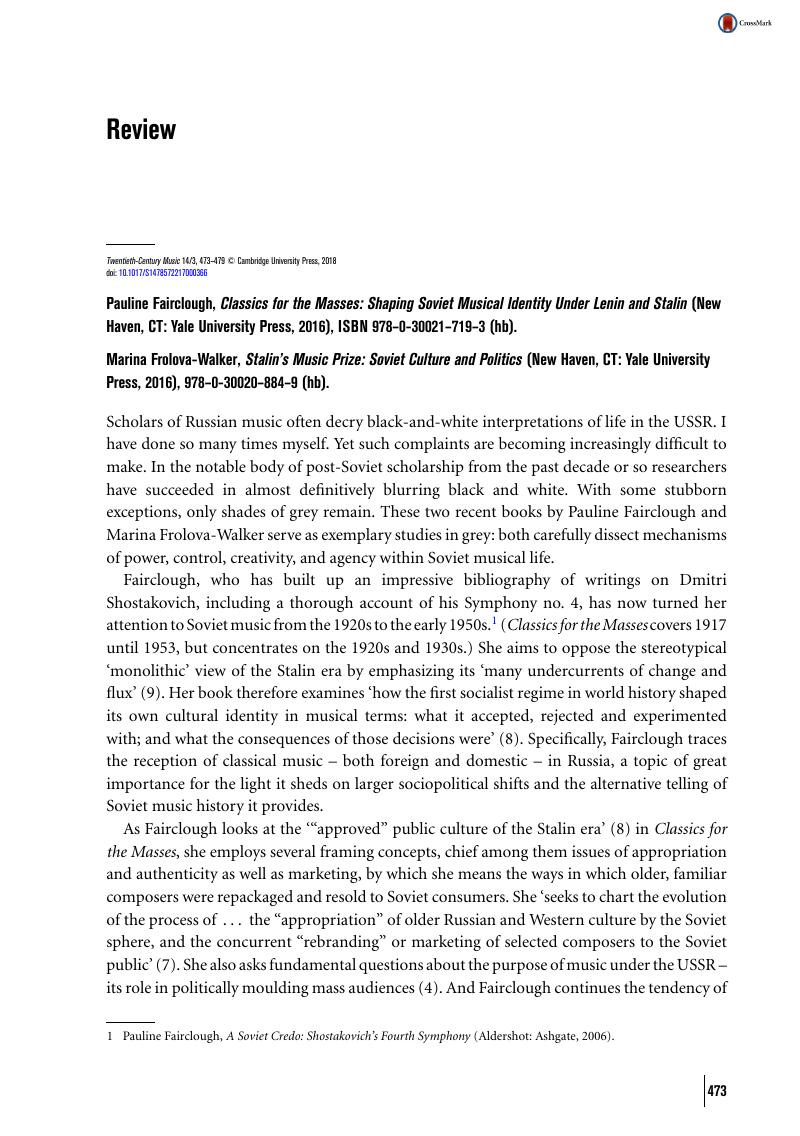No CrossRef data available.
Published online by Cambridge University Press: 08 January 2018

1 Fairclough, Pauline, A Soviet Credo: Shostakovich's Fourth Symphony (Aldershot: Ashgate, 2006).Google Scholar
2 Nelson, Amy, Music for the Revolution: Musicians and Power in Early Soviet Russia (State College, PA: Pennsylvania State University Press, 2004)Google Scholar; and Edmunds, Neil, The Soviet Proletarian Music Movement (Bern: Peter Lang, 2000)Google Scholar.
3 The reference here is to Clark, Katerina, Moscow: The Fourth Rome. Stalinism, Cosmopolitanism and the Evolution of Soviet Culture, 1931–41 (Cambridge, MA: Harvard University Press, 2011)CrossRefGoogle Scholar.
4 See Kreuzer, Gundula, Verdi and the Germans: From Unification to the Third Reich (Cambridge: Cambridge University Press, 2010)Google Scholar; Levi, Erik, Mozart and the Nazis: How the Third Reich Abused a Cultural Icon (New Haven: Yale University Press, 2011)Google Scholar; and Weber, William, The Great Transformation of Musical Taste: Concert Programming from Haydn to Brahms (New York: Cambridge University Press, 2008)Google Scholar.
5 See, for example, Schmelz, Peter, ‘Selling Schnittke: Late Soviet Censorship in the Cold War Marketplace’, in The Oxford Handbook of Musical Censorship, ed. Hall, Patricia (Oxford: Oxford University Press, 2015)Google Scholar; and John Pippen, ‘Toward a Postmodern Avant-Garde: Labour, Virtuosity, and Aesthetics in an American New Music Ensemble’ (PhD diss., University of Western Ontario, 2014).
6 Raku, Marina, Muzykal'naia klassika v mifotvorchestve sovetskoy epokhi (Moscow: Novoe literaturnoe obozrenie, 2014)Google Scholar.
7 See English, James F., The Economy of Prestige: Prizes, Awards, and the Circulation of Cultural Value (Cambridge, MA: Harvard University Press, 2005)CrossRefGoogle Scholar; and for an excellent comparable book from contemporary academic life, Lamont, Michèle, How Professors Think: Inside the Curious World of Academic Judgment (Cambridge, MA: Harvard University Press, 2009)CrossRefGoogle Scholar.
8 Clark, Katerina, The Soviet Novel: History as Ritual, 3rd edn (Bloomington and Indianapolis: Indiana University Press, 2000; first edn 1981), 3–4 Google Scholar.
9 ‘Lost Repertories of the Musical Cold War’, Abstracts of Papers Read at the American Musicological Society Eighty-second Annual Meeting and the Society for Music Theory Thirty-ninth Annual Meeting, 3–6 November 2016, Vancouver, British Columbia (New York: American Musicological Society, 2016), 247–8.